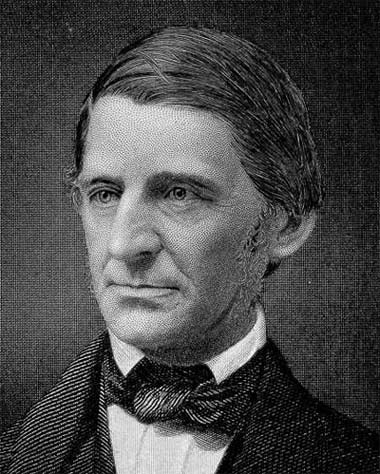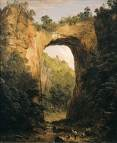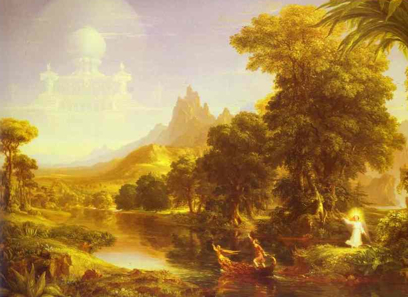
"Build, therefore, your own world. As fast as you conform your life to the pure idea in your mind, that will unfold its great proportions." Emerson, Nature, 1836. Dates to recall: 1703 Newton's Optics is published
1763 Appalachian Mountains as border
1780 Los Angeles pueblo founded
1785 Land Ordinance
1803 Jefferson buy's Louisiana from Napoleon
1810 N. Y. surveys begin for the Erie Canal
1848 Mexico cedes the southwest to the U. S.
1848 Gold in the Sierra Nevada Mountains,
1849 San Francisco founded
1851 Yosemite Valley discovered in an attempt to capture fleeing Indians
Thomas Cole, "Allegorical voyage: Youth," oil on canvas, American.
![]()
A. Emerson, Ralph Waldo (1803-1882) an early American prelate, poet and philosopher, Harvard educated, idealism proponent, & popular thinker.
"...the ruin or the blank, that we see when we look at nature, is in our own eye."
B. The tradition:
- Nature's nation, Europeans repopulating the Americas
- pioneers crafting a nation out of wild nature
- Creating a nation of equality out of the public domain
C. The conflict
"The land was ours before we were the lands." Robert Frost
"Whoever considers the final cause of the world, will discern a multitude of uses that result. They all admit of being thrown into one of the following classes; Commodity; Beauty; Language; and Discipline."
Emerson, Nature, 1836
Notions of the frontier may never really prove to be a viable cultural concept since these borderlands were often misunderstood from an ecological point of view, and are basically a racist defense of manifest destiny. That said the American frontier as a widely held concept was a politically expedient source of wealth and resources, where all scales of reclamation were so prevalent because it was demanded by the terrain. (Byrd) (Emerson) (Thoreau)
Byrd's arguments based on disease.
"The exhalations that continually rise from this vast body of mire and nastiness infect the air for many miles round, and render it very unwholesome for the bordering inhabitants. It makes them liable to agues, pleurisies, and many other distempers, that kill abundance of people, and make the rest look no better than ghosts."
" It would require a great sum of money to drain it, but the public treasure could not be better bestowed, than to preserve the lives of his majesty's liege people, and at the same time render so great a tract of swamp very profitable, besides the advantage of making a channel to transport by water carriage goods from Albemarle sound into Nansemond and Elizabeth rivers, in Virginia."
HISTORY OF THE DIVIDING LINE: RUN IN THE YEAR 1728....the journal of the line between Virginia and North Carolina.... p. 27
http://docsouth.unc.edu/nc/byrd/byrd.htmlSiry, Marshes of the Ocean Shore
"Even prior to the nineteenth century the necessity of marshes was disregarded in favor of a continued reliance on estuarine dredging and coastal reclamation."
Science, Newton's bequest was: absolute time, laws of motion defined space, atomistic view defined matter, fire. The planet Uranus discovered [a new planet] on March 13 of 1781 by a music teacher and composer, Frederick William Herschel, who had become an avid amateur astronomer.
Cosmos, Alexander Von Humboldt, seeing primal order in nature one could discern laws of geography, climate & life. He influenced Charles Darwin.
Creation, Religious revival in America, Germany, and England challenged authority "The Great Awakening" of the spirit.
These three amounted to a revolution away from Puritan and theocratic, monarchic measures of worth, authority, and power.
Emerson's visionary appeal:
"So shall we come to look at the world with new eyes."
Nature, 1836
Emerson represents a break both personally and symbolically with the narrow-minded national past because he broke open the inherent contradictions in Colonial traditions and the values shaped by the imperial experience, locating a source of indigenous and inherent worth in a new idealism; the transcendent spirit abiding in material existence.
The four classes of natures worth |
 |
|---|---|
|
|
|
Natural Bridge, Virginia |
| key ideas | ||
|---|---|---|
| Philosophically considered, the universe is composed of Nature and the Soul. | ||
| A. | Commodity as one of four aspects of nature is "all those advantages which our senses owe to nature." |
|
| B. | "A man is fed, not that he may be fed, but that he may work." | |
| C. | Oversoul or spirit of the world; Nature "is the organ
through which the universal spirit speaks to the individual, and strives to
lead back the individual to it.
|
|
| D. | Laws of the world | |
| E. | Traditions of man and nature | |
| F. | "First, the simple perception of natural forms is a delight" | |
Arguments over the character of matter; the stuff of material existence were reconciled only after 1870s with mathematical descriptions of electricity and magnetism, the table of chemical elements, and radiation.
The ongoing conflict in political philosophy between Jefferson and Hamilton was unresolved until rebellion, and secession of South Carolina in 1860.
Sectarianism
The Second Great Awakening challenged and replaced the authority of established churches --Protestantism further split into new religious sects.
Protestants sought to keep Catholics from coming into the country.
Economic collapses, on the following dates 1819, 1836, 1857, 1872, commercial markets failed leading to prolonged depressions that caused ever widening movements for protecting farms, labor, resources, and the abolition of child labor, slavery, and women's status as property.
Converts to Transcendentalism
- Thomas Cole
- Henry David Thoreau
- Margaret Fuller
- Mary Austin
- John Muir
- Transcendentalism dominated American thought until 1880s when pragmatism challenged the widespread belief in idealism.
- Emerson and others represented an older vision and their values were undermined, if not destroyed by Mexican War (1846-48), the Civil War (1861-65) and expansion westward that provoked (1820s-1890s), Indian wars, and eventually the Spanish American War (1896-98).
- mission: belief we must civilize the savages
- manifest destiny: belief that the Continent belonged to U.S.
- "democratic" values like popular sovereignty undermined authority
- Jacksonian destruction of the Bank of the United States
- direct election of judges
- preemption, settlers on the land had claims that took priority over owners of the land
- compromise: from 1785 until 1850 these agreements worked.
- imperialism: several attempts were made to seize Cuba, Mexico, and Central America
- Population growth
- The new emergent conflict replaced the war between the states:
- industrialism versus commercial trade
- urbanization versus agrarian values
- resources were redefined often clashing with older sources of wealth --
- gold versus grain
- timber and mining
- coal replaced lumber in transport, heating, and refining
- coal gas replaced whale oil and wax for lighting
- the need for fresh-water in cities
- agues, aches and fevers (malaria and yellow fever?)
- pleurisies, chest congestion (tuberculosis or TB, pneumonia, flu)
- distempers, stomach or digestive disorders, fever, sputum discharge (viral phage infections?)
Allegory, a story told intentionally to represent a much more universal and using symbols to convey that meaning.
Imagination, "The Imagination may be defined to be, the use which the Reason makes of the material world." Emerson, Nature, 1836.


